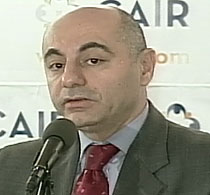2006年VOA标准英语-Syrian Ambassador Welcomes Recommendation for T(在线收听)
By Peter Fedynsky
Washington, DC
13 December 2006
watch Iraq Syrian report
The Syrian ambassador to Washington says his country is interested in talks about stabilizing Iraq, but not if the United States dictates the terms. The Syrian envoy spoke at a panel discussion in Washington about recommendations by the bipartisan U.S. Iraq Study group. VOA's Peter Fedynsky reports.
 |
| Imad Moustapha |
He said Iraq is deteriorating from a disaster to a catastrophe, which could have serious repercussions for Syria. For this reason, he agreed with the Study Group's recommendation of talks with Tehran and Damascus. However, he said any engagement with the United States should be honest, in-depth, and sophisticated.
"We're not going to accept dictation by a superpower. Look at this same superpower and the mess it has brought itself into in Iraq.
And many Iraqis are not accepting the fact that the United States - the superpower of the world - is going to dictate on them the future of their own country."
The Bush Administration has been lukewarm about talks with Syria and Iran, saying those countries are fueling extremism in the region. Ambassador Moustapha, however, recalled Syria's recommendation to the United States when the two countries last held talks prior to the invasion of Iraq.
"We were very clear about at least one thing: we believe that for you to go and invade and occupy Iraq will mean, as far as we understand our region, it will mean you will fuel extremist terrorism across the Middle East. This is exactly what has happened."
Coordinated terrorist bombings in Baghdad on Tuesday killed at least 70 people, mainly poor Shi'ites waiting for jobs as day laborers. Iraqi Prime Minister Nouri al-Maliki blamed the attacks on sympathizers of former dictator Saddam Hussein and Sunni extremists.
President Bush has called Iraq the central front in the war against terror. But Ambassador Moustapha says sectarian extremism and insurgent resistance to the United States rather than al Qaida terrorists are to blame for most of the violence in Iraq.
Nonetheless, an advisor to the Iraq Study Group, University of Maryland politics professor Shibley Telhami says the al Qaida threat is real. "On that question, I think, most neighbors would cooperate, because most neighbors are actually threatened by al Qaida, including the Syrian government, including - arguably - the Iranian government, not just the Saudi government. So in some ways that actually is a potentially core issue for cooperation, not a core issue for conflict."
The Iraq Study Group says the United States should engage Syria and Iran about Iraq without preconditions. President Bush, however, insists that Tehran and Damascus should first stop funding terrorists and pledge support for the Iraqi government and economy.